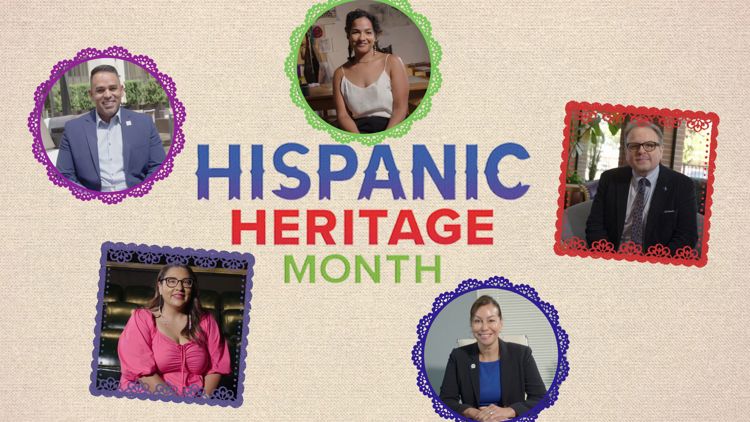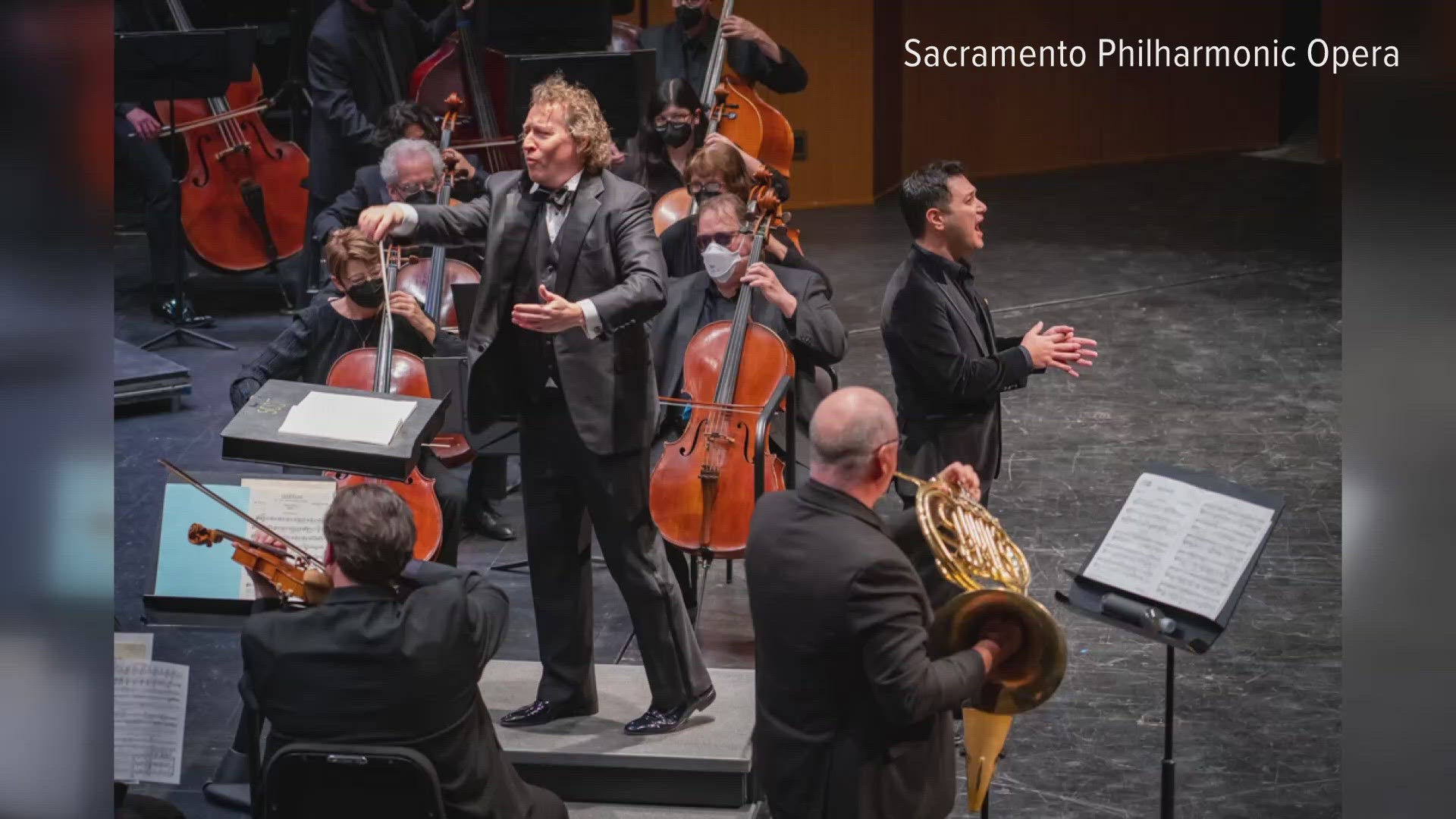SACRAMENTO, Calif. — We observe National Hispanic Heritage Month in the United States every year from September 15 to October 15. Celebrations are centered around recognizing the histories, cultures and contributions of Hispanic and Latino Americans. September 15 marks Independence Day for several Latin American countries — Costa Rica, El Salvador, Guatemala, Honduras and Nicaragua — from Spain in 1821. Several other countries also declared independence from Spain across various years within the month of September.
The 2024 theme for National Hispanic Heritage Month is "Pioneers of Change: Shaping the Future Together," meant to encapsulate the "spirit of innovation, resilience and unity that define the Hispanic experience," according to the National Council of Hispanic Employment Program Managers (NCHEPM).
ABC10 sat down with five members of Sacramento's diverse Hispanic and Latino community as they spoke about overcoming barriers, living authentically and sparking change for future generations.
GET MORE RACE & CULTURE FROM ABC10:
►Explore the Race & Culture home page
►Watch Race & Culture videos on YouTube
►Subscribe to the Race and Culture newsletter
Nicole Limón
Nicole Limón carries multiple important roles in the community as an artist, educator and theater practitioner. She is an actor, director, dramaturg, intimacy coordinator, lecturer for the Theatre & Dance department at Sacramento State University, and founder and artistic director of Matriarchy Theatre in Sacramento. Limón has been an artist for as long as she can remember. She fell in love with writing as a child, a passion shared with her father who was a poet, and she often created skits for her cousins to act out. Her family would later understand these to be qualities of a promising director.
Limón fell in love with theatre and "got the bug" in high school when she secured a role in her first school play, "Pride and Prejudice" during freshman year. But as she continued to participate in productions, she noticed a troubling trend — she was often relegated to roles entrenched in tropes that perpetuated harmful stereotypes tied to her identity. As someone who is Chicana and Yaqui, Limón said she was often thrust into roles as a maid, tía (aunt) or abuela (grandmother) because of her body type and indigenous features.
As a college student at Sacramento State University, Limón sought out opportunities to change the narrative. She founded the Native American Theatre Project and produced a couple of plays, written by Native American women. Seeing the seats fill up with Indigenous and Latino audience members who could finally see themselves in the stories told on stage would motivate her to continue to promote visibility of diverse stories and voices across Sacramento.
Limón took on more leadership roles, including helping establish Teatro Espejo, a longstanding local Latinx theatre company, as a nonprofit. She later founded Matriarchy Theatre in 2020 to carry on her mission to ensure gender parity in theatre for women and diverse communities, not just on the stage but also behind the scenes as directors, writers, technicians and designers. The name "matriarchy" also embodies her approach to theatre through an Indigenous lens, centering community and care for the earth. For Limón, being Indigenous is the first thing she knows about herself, as someone who grew up going to Aztec dance, peace pipe and sweat ceremonies.
Luis Kischmischian
Luis Kischmischian was 12 when he got his first taste for entrepreneurship. He started his own car washing business after investing in a bucket, soap and a sponge. Growing up as the middle child of four other siblings, he saw entrepreneurship as his way to stand out in a big family. But pursuing all of his entrepreneurial dreams, as Kischmischian recalled, was anything but easy.
As a first-generation college student, Kischmischian had to learn how to navigate the college system on his own. He started out at American River College, where he used up all his grant funding, before transferring to Sacramento State University. Instead of taking out loans, he worked three jobs to support his own pursuit for higher education. It wasn't until his research on Latino studies that he was able to learn that he wasn't alone in the challenges he faced. He learned how Hispanic and Latino communities have long been seen as a "deficit" and therefore not granted the same opportunities as others.
Mischian Strategies started out as a pet project for Kischmischian during his MBA program. Today, he's taking it to a real vision of his late father, Larry Anthony Kischmischian, who always pushed his son to pursue his passions. Mischian Strategies is a full consulting and digital marketing firm serving higher education models, health care services, as well as private and corporate companies among others. Along with that, Kischmischian aims to provide students with the tools to succeed, something he wasn't immediately granted. He hopes to launch a nonprofit that would raise funds for students of color and for scholarships to support their post-secondary education journeys.
Mirtha Villarreal-Younger
Mirtha Villarreal-Younger joined the military in 1986, eight years after the disbandment of the Women's Army Corps (WAC) in 1978, which allowed women to fully integrate into the armed forces with male units. Growing up as a first-generation American of Mexican descent, she saw the military as her vehicle to pursuing higher education because she knew her family didn't have the means to financially support her for college. She described the military as the first place where she didn't feel judged for where she lived or her background. She was solely judged for her character and determination.
Now a proud combat veteran with more than 30 years of service in uniform, Villarreal-Younger continues to carry the importance of service and shares the legacy of Latinos in military service wherever she goes. Latinos are currently the fastest growing demographic within the military, representing 17% of the overall forces, and have fought in every U.S. conflict from the American Revolution. Villarreal-Younger instills that pride in her daughter, who has grown up surrounded by other family members who have also proudly served in the forces.
Villarreal-Younger is currently the CEO and president of Agile Construction, a commercial firm specializing in government contracting. Going into construction, she immediately noticed that she was entering yet another male-dominated industry. Driven by her personal experiences serving in nontraditional roles her whole life and often being the only woman sitting at the table, Villarreal-Younger prioritizes contracting and subcontracting with other veteran-owned and minority-owned businesses. She hopes that by sharing her success with others, especially with women of color, she is able to spread the message that young women shouldn't limit their desires or dreams by what society may deem as the traditional roles of a woman.
Adrian Ruiz
Adrian Ruiz grew up in several places he calls home: the Mission District, San Francisco; Miami, Florida and Sacramento. As a young Nicaraguan, baseball was as important to Ruiz as family. From a young age, he looked up to Roberto Clemente, who was not only known for his baseball heroics but also for his service to community. In response to urgent requests for help following the devastation of the 1972 Nicaragua earthquake, Clemente boarded a plane to personally deliver aid and relief to Nicaragua, but the plane crashed into the Caribbean Ocean, taking his life, along with many others, with it. From learning about Clemente's life, Ruiz understood the importance of being of service to the very end.
Ruiz is the executive director of Youth Development Network (YDN), which was established to create more places where young people can thrive and succeed. But in order for that to happen, Ruiz recognized that adults also needed to thrive and succeed. In 2018, he established the Creciente Latinx Leadership program, designed to "prepare and empower the next generation of Latinx leaders to influence business and civic policy decisions," according to the program page. Through YDN, Ruiz hopes to increase Latino representation in leadership. Across the Sacramento region, only 5% of nonprofit executive directors and 7% of nonprofit board of directors identify as Latinx, even though 40% of Californians identify as Latino, according to 2022 American Community Survey data.
September 15, the start of Hispanic Heritage Month, also commemorates Nicaragua's independence from Spain. For Ruiz, the month marks a time to celebrate heroes like Nicaraguan-American political strategist and commentator Ana Navarro, eat traditional Nicaraguan dishes such as nacatamales and queso frito, and even indulge in a little Flor de Caña, a traditional Nicaraguan liquor. During Hispanic Heritage Month, Ruiz also encourages people to recognize the diversity of the Latino community, from the border of San Diego down to the islands of Argentina.
Ashley Tattersall-Diaz
Ashley Tattersall-Diaz is an artist, death researcher, educator and printmaker. Her art is often paired with her interests about death and mortality and how it impacts people internally and interpersonally. This was initially driven by her fear of death, which came from growing up Pentecostal. Early on in her exploration of death and mortality, Tattersall-Diaz came across the death positivity movement, which promotes removing the stigma around open conversations about death and accepting death as a natural part of life.
However, following the murders of George Floyd and so many others, which reignited the Black Lives Matter movement, she felt a personal responsibility as an artist to center community in her work. That's when she stumbled across Zion Cemetery, the first African American cemetery in Tampa, which was developed over to make space for an apartment complex and other buildings and erased from maps in the mid-20th century. Learning about the holistic erasure of a culture and history impacted Tattersall-Diaz personally because she saw cemeteries as a way to trace her own lineage on her dad's side, who is half Black and was adopted by a Puerto Rican family.
Much of Tattersall-Diaz's work is evocative of her own research and she describes her work as a gentle introduction to such topics that deal with violence and death through abstraction and landscapes. She hopes people who see her artwork become more curious about the grounds they are on and seek to understand the history of the land.
Tattersall-Diaz describes herself as someone who grew up "very Puerto Rican," despite the fact that she grew up in a small town in Florida for most of her life and felt she had to assimilate with her classmates in a school that was majority white. As much as she didn't possess any remnants of an accent as a result of assimilation, she was still loud and musical and proud to be Boricua (a person of Puerto Rican descent). To her, Hispanic Heritage Month is all about digging deeper into her own culture and understanding of it, while also appreciating other cultures that make up the diverse Latino tapestry.
We want to hear from you!
The Race and Culture team's mission is to serve our diverse communities through authentic representation, community engagement and equitable reporting.
Accomplishing our goals of inclusive reporting requires hearing from you. Is there a person or place that you want us to highlight? Email us at raceandculture@abc10.com or fill out the form below.



